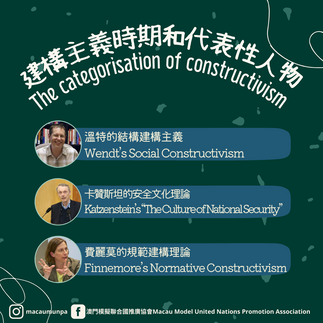Constructivism
- Model United Nations Promotion Association Macau
- Jan 21, 2022
- 1 min read
Constructivism is a new way of explaining international relations that is different from realism. Its core idea is that "actors and structures are mutually constructed", meaning that the behavioural decisions of people, organisations, and nations are influenced and even constrained by established social traditions, social habits, and personal identities, and that these so-called "traditions" do not exist forever, but are jointly led and constructed by society.
Furthermore, constructivism also claims that “power politics” has fundamental effects on social construction and people’s decision making. Compared to the physical structure of international relations, constructivism focuses more on social norms and its order.
Constructivism originated in the 20th century after the Cold War and was seen as a theory that drew on sociology to study international relations. The appearance of constructivism challenged the existing realism at the time. Constructivism can be categorised according to its period and representative figures: Wendt’s social constructivism, Katzenstein’s “The Culture of National Security”, and Finnemore’s normative constructivism.
Nowadays, constructivism, along with realism and liberalism, constitutes a triumvirate in the field of international relations, but at the same time constructivism has raised a completely new perspective in understanding anarchy of states.












Comments